From the Blog
Garden Oasis Farm Gears Up for a New Growing Season
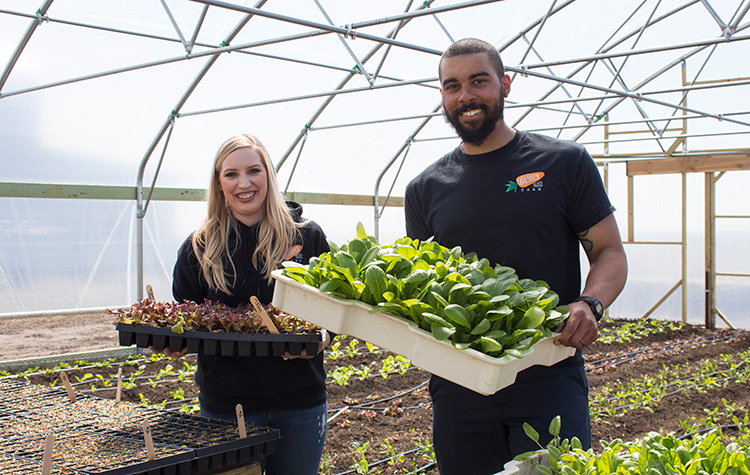
“See the 3 silos at the top of the hill?”
T.D. points to the hill on the near-western horizon.
“That’s my grandparents’ place. And that one to the left of it with the 3 grain silos? That’s where I lived until I was 11. Now my uncle lives there.”
We’re out in the Iowa countryside, pretty darn remote – so remote that their 3 dogs, cat, a huge flock of chickens, and even 3 goats all run around totally free, no fences needed – with those sweet, rolling Iowa hills around us, holding Garden Oasis Farm in the palm of their hand.
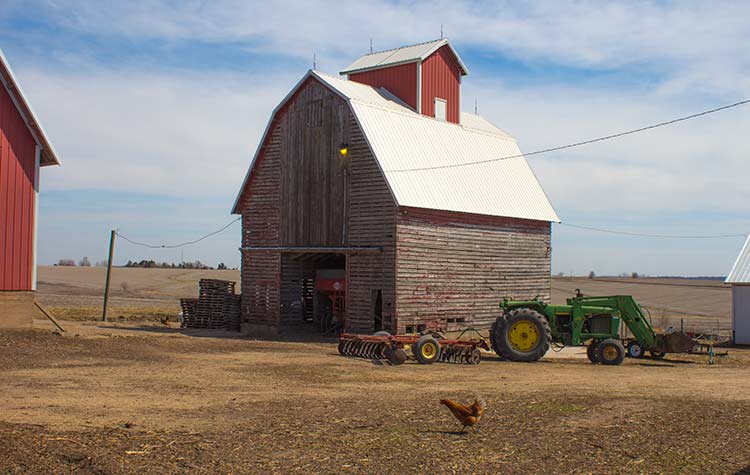
“I was told as a kid, ‘You don’t want to be a farmer, there’s no money in it,’” T.D. recalls.
“But I grew up on a farm, always loved everything about it, it’s my passion. I like to get up right when the sun’s up, do chores… The only days I don’t like are when you wake up, and it’s already 90°F.”
“And there sure are those days!” his wife Sarah chimes in, with a laugh.
Thankfully he didn’t take that advice to skip farming to heart. Growing up on a farm gave him a realistic view of what he was getting into:
“I knew what it was all about. But first thing in the morning, watering transplants in the hoophouse… It’s peaceful. You realize what you’re taking care of right now is going to provide a year’s worth of produce.”
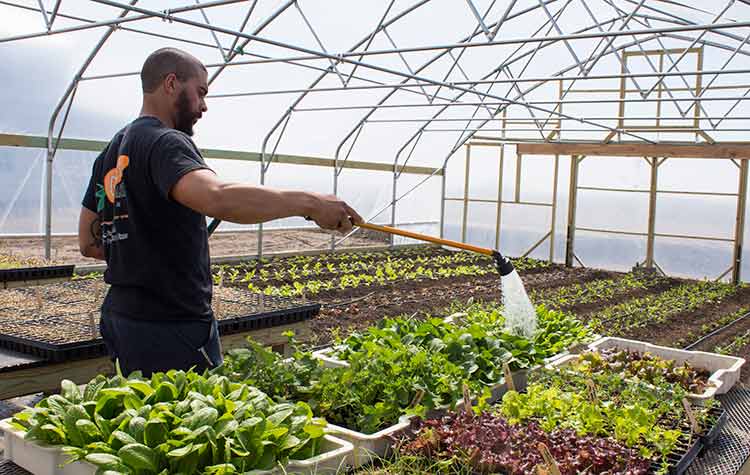
Their farm name is really quite literal – theirs is a sustainable garden oasis amidst Iowa’s row crop sea:
“Around here, everything’s corn and soy,” T.D. gestures, “the fields are as big as you can make ‘em.”
Like most farms around here, the family farm used to be diversified:
“Cattle, hogs, hay, oats, beans, raspberries. We had big gardens, and my uncle raised a quarter acre of raspberries and sold them to a couple Iowa City restaurants, back when I was a kid.
I remember picking raspberries all the time (but I think I ate more than I harvested),” he admits.
Over time, “Each [item from that list] started going away,” until it was down to just row crops.
His grandparents are in their 80s now.“But then I came up and started adding variety back in,” he smiles. His uncle still does some farming, “but I was the only one brave enough to take on vegetables!”
It certainly does take bravery to try to make it with vegetables these days, considering the lack of crop subsidies and crop insurance for vegetable farmers (comforts commodity corn and bean farmers get to enjoy), and crazy land prices.
But regeneration is totally possible – in diversification of our farms, of our soils, of our dinner plates, and of our communities.
But unfortunately by the time this new farming generation was ready, it was after the equipment had been sold off or rusted out.
Happily, though, there was one handy one still left:
“This tractor is my grandpa’s – and it’s the main tractor we use for planting.”
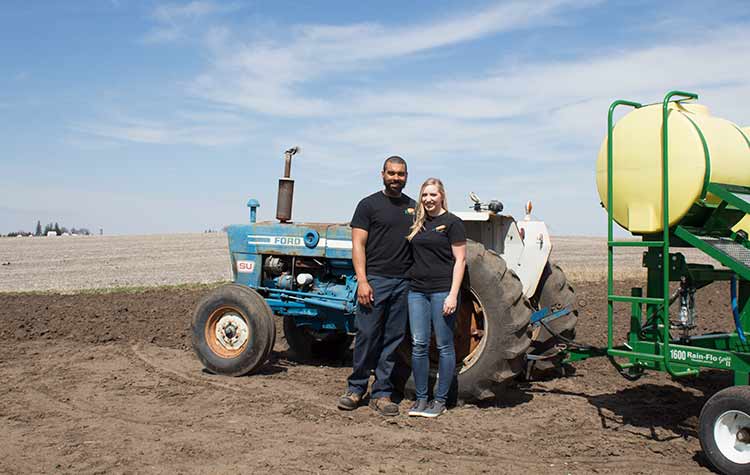
After school – T.D. studied health and human physiology at the University of Iowa and Sarah studied cosmetology at La James in Iowa City – they thought about moving to St. Louis, or the Carolinas, but then T.D. realized he just really wanted to farm.
They’d been together for quite a while then, but “he thought he’d lose me there,” Sarah smiles.
“I never thought she’d want to farm!” T.D. exclaims.
“Cosmetology is fun, but I like doing this more. It’s a passion I never knew I’d have,” Sarah grins. “My friends do find it pretty funny that I work with dirt now.”
Sarah grew up around here too.
“My family didn’t farm though,” she shrugs.
“But her grandpa farmed,” T.D. interjects.
“Most people around here are just 1 or 2 generations away from someone in the family having a farm, or still farming.”
If they’re still farming though, “It’s not this kind of farming! It’s nice to show people there’s something different you can do, that you can make a living farming without having 2,000 acres in row crops.”
Vegetable farming can be successful in Iowa, with grit, and working hard, and working smart.
Before they jumped in, they did that smart thing of looking and learning before you leap, and T.D. spent half a season at Susan Jutz’s ZJ farm and Local Harvest CSA, just north of Solon.
“I learned a lot from Susan,” T.D. nods.
“I’ve also learned a lot from PFI (Practical Farmers of Iowa),” impressed with how many useful farming workshops they offer, “and from Jason Grimm.”
Jason grows dry black beans for the Co-op with organic methods (find them both in our bulk bins and packaged), and is also a food systems planner with IVRC&D, helping other farmers get off the ground.
Digging In
Then T.D. and Sarah took the plunge and moved to Independence, Iowa, where they commuted back to the 1-acre family farm in Coggon.
“It was totally new to me,” Sarah recalls.
“It’s been really exciting to see her passion grow for it,” T.D. agrees, “like mine. It’s a group effort to make a farm happen, that’s for sure.”
Their 100-member CSA (Community Supported Agriculture) is still the core of the farm:
“It’s what we started with. This’ll be our 6th season.”
They introduced CSAs to their area, and “we kept growing along with it. We had a big leap to grow from 1 acre (doing everything by hand) to 5 ½ acres in one year.” The stars aligned and this place came up for sale, just a stone’s throw of where T.D. grew up.
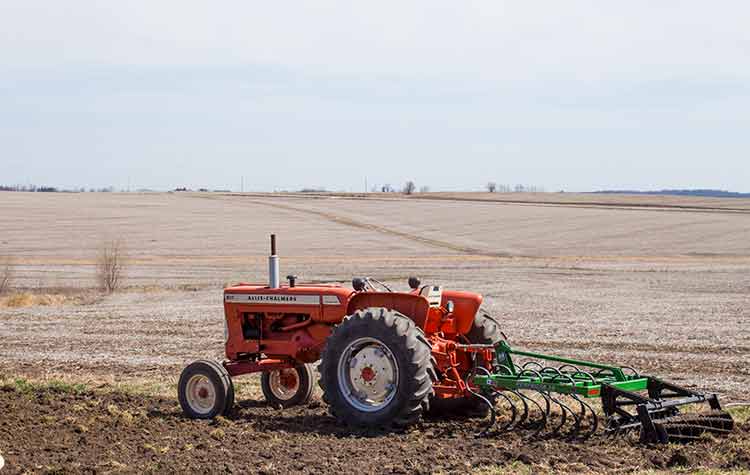
“Now we’re within a tractor’s drive of wherever we need to be!”
It’s been really fun to see their neighbors switch from rubbernecking by the farm, “wondering what we were doing out here on our weird equipment,” like small tractors built to do different tasks than the huge row crop monster tractors, man-powered tools like wheel hoes (“Wish we’d gotten that right at the very beginning!”), water-wheel transplanters to help put transplants in the ground by hand much more efficiently, to “now our neighbors are coming out here to get food.”
Some of them were shocked to see the old style of tractors out in the field doing work, “rather than riding in a parade, or getting slick paint.”
“Selling to New Pi was a big priority for us,” as part of their business model.
“It’s the premier place to get local food, and it’s where we do all our shopping for fresh foods, especially in the winter!
We know for a fact the berries you guys get for the Co-op are better quality than everywhere else – we’ve tried them at [super popular national chain grocery stores] and they’re just terrible, just mush.
And you guys at the Co-op are really fair to the producers.”
“We tried working with [a local chain grocery store] and they were really terrible to work with. We decided our goal is to sell just through restaurants and the Co-op.”
They’re also at farmers markets: at the Iowa City Downtown Market Wednesdays & Saturdays (May through October) & at the Cedar Rapids Downtown Markets.
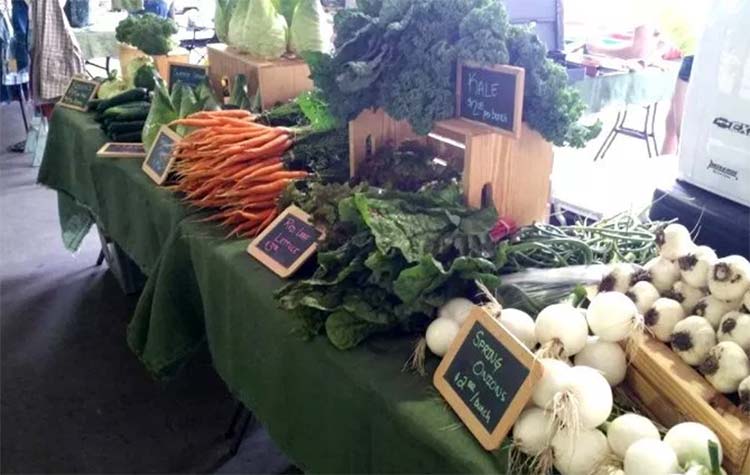
They increased to about 10 acres in production, and now they’re bringing it back down to a more efficient and manageable 7 acres, and “we’ve decided we’re not going to grow much more, size-wise.”
They have one greenhouse on their home farm where they live, and another greenhouse at T.D.’s grandparents’.
He’s been full time on the farm for the past 3 years of the 5 years they’ve been farming. Sarah was full-time on the farm too, but took a job off farm last fall.
“We’re working to get back to both of us full time on the farm. That’s the goal.”
Unfortunately the current health insurance situation in our country makes it really hard for small businesses like this one to afford health insurance, so off-farm health benefits?
“We needed that help.”
They both went to high school at North Linn, so it’s nice that they’ve come full circle and they now have kids from their alma mater coming out to work summer jobs on their farm.
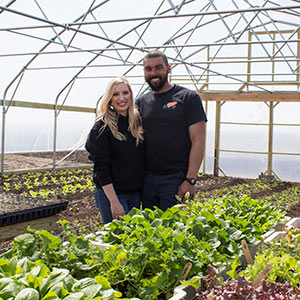
They’ve had a lot of them return year after year, a testament to their efforts to make it a good working environment.
“It’s not hard to make farming fun… well, unless its 110°F and everything’s going wrong!” T.D. laughs.
And those days sure happen. But they’ve had twin brothers from the high school that are coming back for their 3rd season, and their younger sister wants to work on the farm now too.
Another high school staff member wants to be an organic dairy farmer. Farming is a really hard occupation to break into:
“Pretty much there are only 2 ways to get into farming – if you have someone that has the land and the equipment, or if you’ve already been doing it.”
There’s no replacement for good helping hands, and there’s no replacement for new insights either:
“I like to read in the winter. Not in the summer!”
T.D. chuckles. There’s no time for farmers to sleep in the summer, much less read.
The Lean Farm series has been really impactful for him, basically coaching him on how to cut out as much waste as possible from their operation for the highest efficiency:
“Like getting this vacuum seeder – I’m pretty sure it already paid for itself.”
Land efficiency is important too, both because land prices are so high, and because in sustainable farming, it’s important to give different growing plots time off, seeding them with cover crops that significantly improve the soil quality and nutrition, eliminating the need for artificial inputs like chemical fertilizer.
“We’re able to produce more each year, on less area.” That’s what working on soil nutrition will get you!
“We’re trying to leave everything better than we found it.”
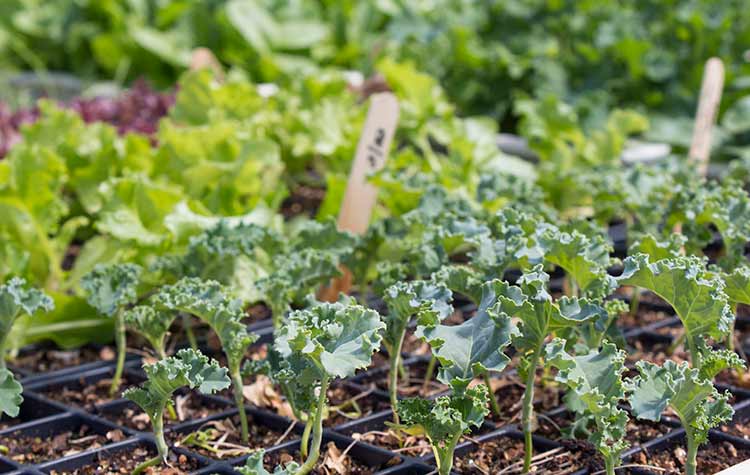
Why do they grow with organic methods?
“It just makes more sense,” Sarah shrugs.
“I wanted to be able to eat things right out of the ground and not worry about what’s on it. And sometimes I think you can even taste the chemicals on some produce,” T.D. explains.
“Based on what I learned in my nutrition classes at the University, Professor Kathy Mellen taught me that ‘a diet isn’t something you go on – it’s what you eat.’
We want to provide the whole foods,” that taste better too – local vegetables truly taste sweeter and more flavorful (everyone remembers them for their sweet, sweet carrots) than conventional veg trucked in from who-knows-where. They want to do their part to make a whole foods based diet easier and more appealing for people.
“Some of our farming friends have commented that they are jealous of our nice black dirt, with a little bit of sand in it. It just seems to make things taste good.”
It doesn’t necessarily come free though – they’ve worked hard with “cover crops (like our first solid year of oats and sweet clover) to get the soil to a place we’re happy with. You can never get too much organic matter in there. And it holds a bit of the rain,”meaning both that they don’t have to irrigate as much as conventional farms, and that organic method farms are working to fight flooding by creating soil that simply holds more water in the ground, where it should be.
“There are some days when it’s really hard, like when we got hailed on really badly last year and thought all the plants might be lost,” T.D. recalls.
“But plants are resilient. They come back,” and on days like that,
“I have to sit back and remind myself that we’re really lucky that we get to do this for a living.”
